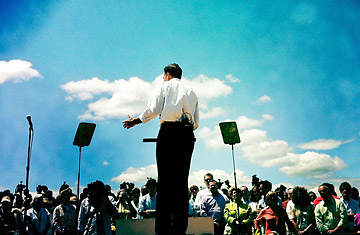
"Barack Obama has failed America," Mitt Romney said unequivocally at his first New Hampshire town meeting, repeating the signature line of his presidential-campaign announcement speech a day earlier. Unequivocal is not a word that traditionally has been associated with the former Massachusetts governor, but that was then, and the retooled edition of candidate Romney is much improved. He proceeded to lay out the economic case against Obama: 16 million out of work, home values collapsed, higher gas and food prices.
In other words, Obama is the grandson of Herbert Hoover and the son of Jimmy Carter. "He's tried," Romney said sorrowfully, a lock of his less-slick-than-last-time hair falling over his forehead. "[But] what he did simply was wrong. He extended the downturn and made it deeper ... How is it that President Obama was so wrong? I happen to think that in part he took his inspiration from Europe," Romney continued, citing a litany of Obama's proposals like deficit spending and "federalizing" health care. "He has been awfully European. [But] you know what? European policies don't work there. They sure as heck aren't going to work here. I believe in America! I believe in free enterprise. I believe in capitalism. I believe in the Constitution."
Well, O.K. It wasn't exactly exhilarating, but it was the best of all possible Mitt Romneys. The crowd responded with respectful applause, but not rapture — I've never seen a Republican crowd actually blown away by Romney — and the respect grew as the candidate gave detailed answers to questions from the surprisingly sparse audience. When asked what he'd specifically do about the economy, he had a seven-point plan ready to roll. His answer on budget cutting was standard-issue GOP, but with a humane gloss: "There are lots of programs that I like, that we all like, but we can no longer afford." He barbed the Chinese for manipulating their currency, which was downright brazen for a free-trade Republican. He even challenged Limbaugh Law a bit by suggesting that climate change is real and perhaps even man-made, a little. (King Rush responded by dismissing Romney: "Bye-bye, nomination.") Romney's answers did not seem pretaped, though they obviously were. They seemed thoughtful and interesting — and far more nuanced than the current conservative repertoire, which allows for no "likable" government programs, no man-made global warming, no assumption of decent intent by a hardworking but wrong President Obama. It is this appeal, which he effectively repeated on June 13 in the first real Republican debate, that might actually attract some independent voters.
In a normal presidential campaign, this sort of focused and efficient candidacy would be just about all Mitt Romney needs to win the Republican nomination. He is, after all, next in line — just as John McCain was in 2008, and George W. Bush in 2000, and Bob Dole in 1996 and George H.W. Bush in 1988. Even Ronald Reagan, for all the revolutionary talk, was the primogeniture candidate in 1980, the next in line after Gerald Ford. Romney certainly has problems: he is a Mormon who passed a mandated, universal health care plan in Massachusetts, the direct precursor to Obama's health care reform. But McCain authored campaign-finance reform — sort of like serving pork for Passover, among conservatives — and he believed in global warming too, for a while. And while Romney is not nearly as well loved as Reagan or even George W., McCain wasn't much liked by the Republican establishment either — and Romney has the advantages of money, a smart managerial résumé, mainstream conservative economic views ... and, well, he sort of looks like a Republican President should.
And yet there is a jittery sense among Republican savants that Romney is a straw man, ready to be toppled, because the party has changed irrevocably. It has traded in country-club aristocracy for pitchfork populism. The Tea Partyers and talk-show hosts who define the new Republican Party believe in the opposite of primogeniture. They believe in the moral purity of political virginity. After Sarah Palin, amateurism has become a Tea Party hallmark. Herman Cain, the African-American business executive who was the Teasies' flavor of the month — before the debate — emphasizes his total absence of governmental experience, to roars of laughter and approval on the stump. In addition, the very structure of the nominating process has changed. It won't be a stately procession from Iowa to New Hampshire to South Carolina to Florida this time. It will look more like the NCAA basketball tournament, only with two instead of four brackets: the Iowa bracket, which will feature the social-conservative and populist candidates like Minnesota Congresswoman Michele Bachmann and former Pennsylvania Senator Rick Santorum — and perhaps Sarah Palin and Texas Governor Rick Perry; and the New Hampshire bracket, which will feature more-moderate candidates like Romney and former Utah governor Jon Huntsman, focused on the economy. Some, like former Minnesota governor Tim Pawlenty, will try to finesse the brackets and play in both, but they are likely to be pulled gravitationally toward one or the other vision of how to win the nomination — Iowa or New Hampshire, populist pitchforkery or center-right plausibility.
